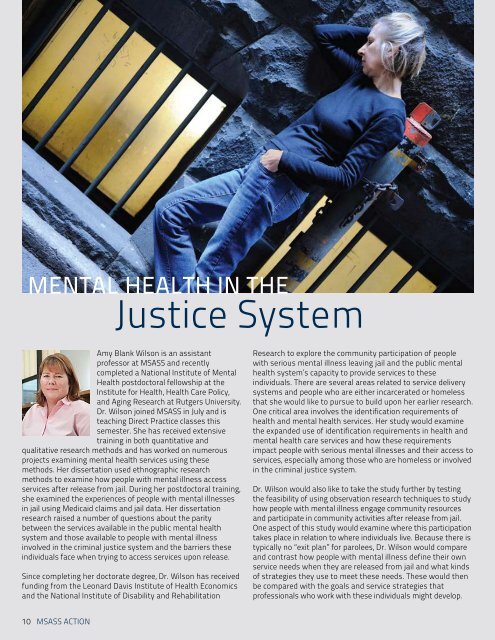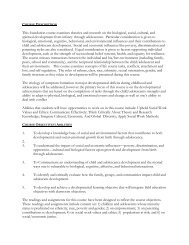Mental Health in theJustice SystemAmy Blank Wilson is an assistantpr<strong>of</strong>essor at MSASS and recentlycompleted a National Institute <strong>of</strong> MentalHealth postdoctoral fellowship at theInstitute for Health, Health Care Policy,and Aging Research at Rutgers University.Dr. Wilson joined MSASS in July and isteaching Direct Practice classes thissemester. She has received extensivetraining in both quantitative andqualitative research methods and has worked on numerousprojects examining mental health services using thesemethods. Her dissertation used ethnographic researchmethods to examine how people with mental illness accessservices after release from jail. During her postdoctoral training,she examined the experiences <strong>of</strong> people with mental illnessesin jail using Medicaid claims and jail data. Her dissertationresearch raised a number <strong>of</strong> questions about the paritybetween the services available in the public mental healthsystem and those available to people with mental illnessinvolved in the criminal justice system and the barriers theseindividuals face when trying to access services upon release.Since completing her doctorate degree, Dr. Wilson has receivedfunding from the Leonard Davis Institute <strong>of</strong> Health Economicsand the National Institute <strong>of</strong> Disability and RehabilitationResearch to explore the community participation <strong>of</strong> peoplewith serious mental illness leaving jail and the public mentalhealth system’s capacity to provide services to theseindividuals. There are several areas related to service deliverysystems and people who are either incarcerated or homelessthat she would like to pursue to build upon her earlier research.One critical area involves the identification requirements <strong>of</strong>health and mental health services. Her study would examinethe expanded use <strong>of</strong> identification requirements in health andmental health care services and how these requirementsimpact people with serious mental illnesses and their access toservices, especially among those who are homeless or involvedin the criminal justice system.Dr. Wilson would also like to take the study further by testingthe feasibility <strong>of</strong> using observation research techniques to studyhow people with mental illness engage community resourcesand participate in community activities after release from jail.One aspect <strong>of</strong> this study would examine where this participationtakes place in relation to where individuals live. Because there istypically no “exit plan” for parolees, Dr. Wilson would compareand contrast how people with mental illness define their ownservice needs when they are released from jail and what kinds<strong>of</strong> strategies they use to meet these needs. These would thenbe compared with the goals and service strategies thatpr<strong>of</strong>essionals who work with these individuals might develop.10 MSASS Action
The Role <strong>of</strong> <strong>Social</strong> Work inCancer ResearchJung-won Lim is an assistant pr<strong>of</strong>essor at MSASS and a member <strong>of</strong> theBuilding End-<strong>of</strong>-life Science through Positive Human Strengths and Traits(BEST) Center <strong>of</strong> the CWRU Frances Payne Bolton <strong>School</strong> <strong>of</strong> Nursing. Shereceived her Ph.D. in <strong>Social</strong> Work from the University <strong>of</strong> Southern California in2006, and joined the MSASS faculty in July.Dr. Lim’s earlier positions include medical social worker in theHangang Sacred Heart Hospital, Seoul, Korea, and researchfellow in the Center <strong>of</strong> Community Alliance for Research andEducation (CCARE) at the City <strong>of</strong> Hope National Medical Center,Duarte, California. Her major research focus involves cancersurvivorship and caregiving issues for cultural and ethnicminority and underserved populations. She has a specialinterest in psychosocial and behavioral outcomes with the goal<strong>of</strong> improving overall quality <strong>of</strong> life and reducing cultural andethnic disparities among underserved Asian-American cancersurvivors and their family members.As an ethnic minority woman (Korean) living in the UnitedStates, Dr. Lim came to recognize the salience <strong>of</strong> culture in herown life, as well as the psychosocial and socioecologicalcontexts among diverse ethnic populations. She arrived in theUnited States in 2001 to begin her academic and researchcareer at the University <strong>of</strong> Southern California (USC). Beforecoming to the United States, she worked as a medical socialworker, providing patients with diverse psychosocial andfinancial services for three years. While working as a socialworker, Dr. Lim recognized the need for a pr<strong>of</strong>essional andsystemic approach to working with patients and decided topursue further study in United States. Her initial focus was onpatients with chronic physical illness (not specific to cancersurvivors), but a calling to psychosocial oncology plunged herinto a lifetime commitment to the field as a research scientist.In 2009, Dr. Lim, as principal investigator, submitted a proposalto the National Institutes <strong>of</strong> Health/National Cancer Instituteto examine family communication and coping among KoreanandChinese-American breast cancer survivors and theirfamilies. The proposal was funded at its first submission. Thegoal <strong>of</strong> the project is to better understand whether and in whatways talking about a traumatic event may help Asian-American cancer survivors make sense <strong>of</strong> the experience, findmeaning, and achieve emotional resolution. The specific aim <strong>of</strong>this study is to investigate the patterns in familycommunication, coping, and health-related quality <strong>of</strong> life(HRQOL) between Chinese- and Korean-American breastcancer survivors, and to explore dyadic relationships in familycommunication and coping between the survivors and familymembers using a culturally responsive framework. This studywill benefit future research on the development <strong>of</strong> familycommunication and family coping models for Chinese- andKorean-American breast cancer survivors and their families. Itwill also demonstrate the applicability and efficacy <strong>of</strong> theculturally-tailored models, and develop the evidence-basedintervention programs that will improve health-related quality<strong>of</strong> life.Currently, Dr. Lim is engaged in a pilot study with the FrancesPayne Bolton <strong>School</strong> <strong>of</strong> Nursing to expand her studies <strong>of</strong>partner communication for women with breast cancer, menwith prostate cancer, and men and women with colorectalcancer on the purpose <strong>of</strong> improving family resilience andquality <strong>of</strong> life. These survivors and their partners will includeAsian-, African-, and European-Americans.Dr. Lim says, “These projects help me to establish my career asan independent scientist in the psychosocial and behavioralcancer research arena, and, in turn, diversify the pool <strong>of</strong>researchers who are committed to understanding andaddressing the needs <strong>of</strong> Asian Americans cancer survivors.”FALL <strong>2010</strong> 11
















